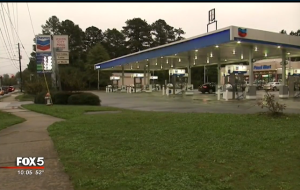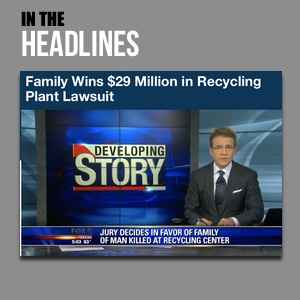
(Fox 5 News)
Was Security Adequate? Our Legal Take: 1 Killed in Union City Gas Station Shooting
Local News
A fatal shooting and carjacking outside a Union City Chevron station reportedly claimed the life of an innocent man early Saturday morning, November 7, 2015.
According to FOX 5 News, “[s]urveillance video from the store shows a man with a gun rush toward [the victim] just outside the front doors of the convience store. The two get into a brief scuffle, [the victim] is knocked to the ground. He gets back up and that’s when the gunman shoots him multiple times.” Police are reportedley still searching for the gunman.
Our Legal Take
The Murray Law Firm questions the level of security provided to those on the gas station property, and whether this tragedy may have been prevented.
- What security measures, such as bright lighting or security patrols, were in place to deter crime?
- Have there been previous incidents of violence on or near the property and, if so, were any additional security precautions implemented by the gas station owner or management to protect patrons?
By law, property owners are required to protect all patrons legally on the premises from any foreseeable harm. Should the facts of this matter reveal that the gas station owner or management failed to provide adequate security, the family of the victim may elect to seek justice and pursue a legal claim for his wrongful death. Based upon its extensive and successful experience in handling negligent security cases in Georgia, The Murray Law Firm suggests that photographs and a thorough, unbiased inspection of the property will need to be performed immediately, before any evidence may be repaired, damaged or destroyed.
We Fight for Victims of Security Negligence in Georgia…Contact us Now for a Free Consultation.
 The Murray Law Firm has recovered millions of dollars for victims of unsafe properties in Georgia, and recently obtained a $29.25 million dollar verdict for one of our Clients in Fulton County State Court.
The Murray Law Firm has recovered millions of dollars for victims of unsafe properties in Georgia, and recently obtained a $29.25 million dollar verdict for one of our Clients in Fulton County State Court.
We represent our Clients on a contingency agreement, which generally means that no fees or payments are owed until and unless we recover. Anyone seeking further information or legal representation is encouraged to contact us via e-mail (click here) or by telephone at 404.842.1600. Consultations are free and confidential.
Choosing the Right Attorney
Selecting the right attorney for you or your family is highly important. You must feel confident that the attorney you hire has a complete understanding of the law applicable to your particular case, and has successful experience in handling such cases.
Important: Do not hire a lawyer who has violated the Rules of Professional Conduct!!!
You should not hire an attorney who calls you or visits you unsolicited, or anyone that contacts you directly to offer legal services. This activity is strictly prohibited by Rule 7.3 of the American Bar Association (ABA) Model Rules of Professional Conduct, which states as follows:
 A LAWYER “SHALL NOT” CONTACT A PROSPECTIVE CLIENT THROUGH A “LIVE TELEPHONE” OR AN “IN-PERSON” VISIT.
A LAWYER “SHALL NOT” CONTACT A PROSPECTIVE CLIENT THROUGH A “LIVE TELEPHONE” OR AN “IN-PERSON” VISIT.
– RULE 7.3, ABA MODEL RULES OF PROFESSIONAL CONDUCT.
If an attorney, or someone acting on behalf of an attorney, contacts you in this manner, that attorney is in violation of this Rule. This unethical and unprofessional activity on the part of the lawyer is good sign that you should stay away. It is imperative that you are represented by an attorney who is capable of advocating for you within the confines of the law, and an attorney who fails to abide by the Rules of Professional Conduct is probably not the best fit. In fact, any such attorney should be immediately reported to the local State Bar Association. If you have been contacted in such an unsolicited manner, contact us and we’ll assist you in filing a report.

Contingency Fees Disclaimer: “Contingent attorneys’ fees refers only to those fees charged by attorneys for their legal services. Such fees are not permitted in all types of cases. Court costs and other additional expenses of legal action usually must be paid by the client.”
 Georgia Legal Report
Georgia Legal Report


